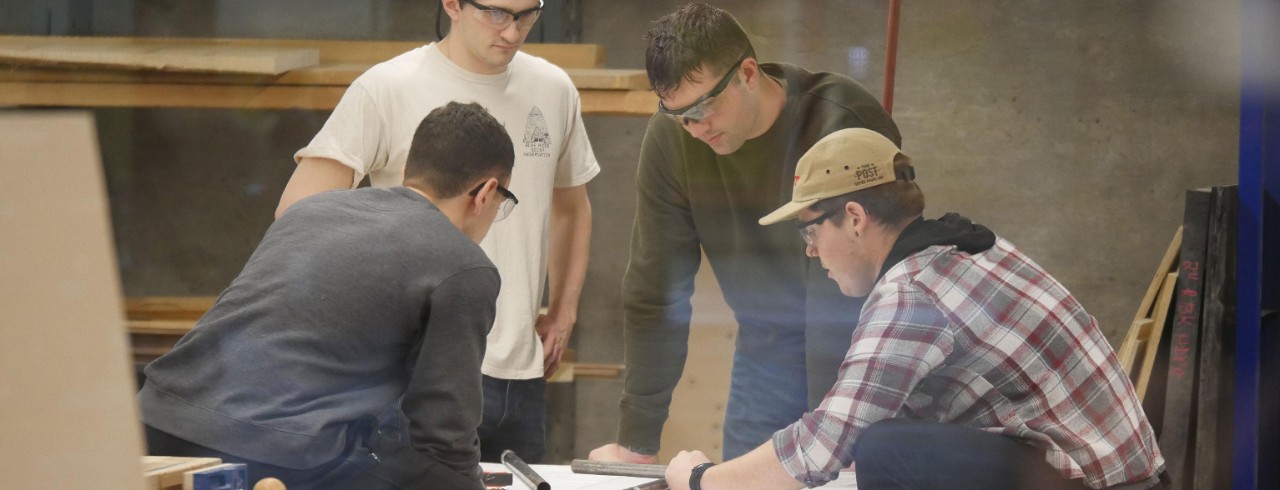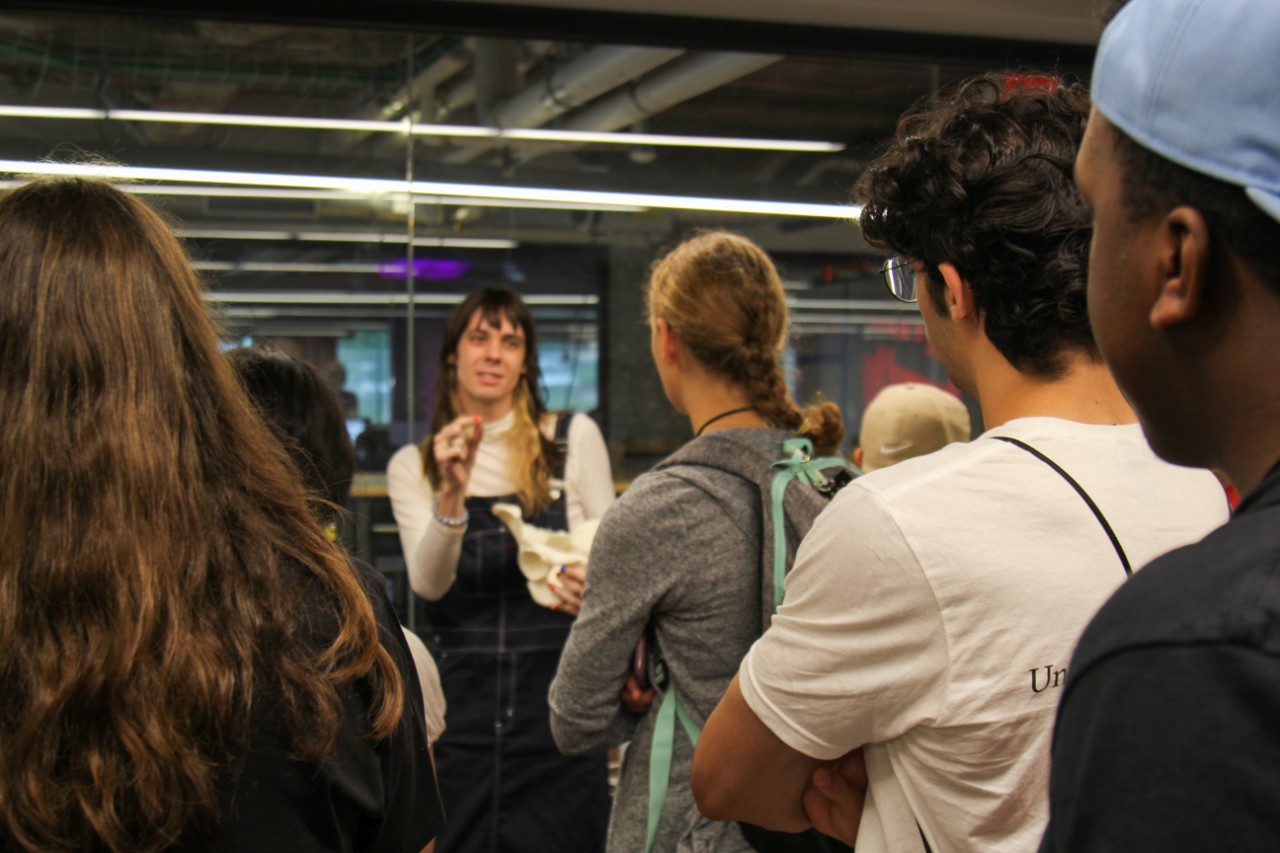
Beginner’s guide to using a makerspace
Makerspaces offer room to develop a new skill or hobby – just get past your pride first
Makerspaces are ideal for those who are excited to build things while developing new skills.
These collaborative workspaces, equipped with tools like 3D printers and laser cutters, provide access to advanced equipment at little to no cost.
Despite their various appealing features, many feel apprehensive about using a makerspace for the first time. After all, who has experience using a resin printer? The reality is that makerspaces are intended for the uninitiated to help them develop new skills, build exciting projects and have fun in the process.
The University of Cincinnati Makerspace housed at the 1819 Innovation Hub is one of the premier facilities in the United States. It boasts over 12,000 square feet of equipment and regularly hosts more than 30 unique programs. We spoke with Lucy Weaver, coordinator of Makerspace operations, about her top five steps for beginners.
1. Sign waivers
Once you’ve decided to join a makerspace (great choice!), it’s time to consider how the process works. Each facility will have its own set of rules, but they’ll likely mirror the guidelines at UC. You’ll typically pay a low monthly rate to use makerspaces, though UC students, faculty and staff have free access to the multitude of tools in our space.
Once you’ve registered for membership, you’ll need to sign a waiver. Expect this to include guidelines such as the following:
- You’re assuming your own risk by entering the makerspace
- Certain tools require obtaining equipment certification to use
- Users must always follow safety guidelines
- Clean up after yourself
- Creating weapons of any sort is forbidden
- Use personal protective equipment (PPE) when required
- You must replace items damaged by personal misuse or negligence
- Treat all others with respect, patience and dignity
These forms shouldn’t take long to fill out, so you’ll be ready to go in no time.
2. Register for workshops

Lucy Weaver leads a workshop in the UC Makerspace. Photo/UC Marketing and Communications
The quickest way to gain knowledge and speed using makerspace tools is by signing up for workshops, certification programs and equipment training. These events are hosted by experienced staff members at the makerspace and provide a simple method to become proficient.
Weaver recommends guided workshops, where instructors carefully lead participants as they build their first objects.
“If you have an interest in making but aren’t sure where to start, guided workshops are a great opportunity,” Weaver said. “These workshops can teach you valuable skills, and you’ll go home with an object you’ve proudly made.”
Another excellent entry point is getting equipment certification. Many tools are only available to those who’ve attended training sessions, so you might as well get them out of the way in a place where questions are encouraged.
As you attend more workshops and training sessions, you’ll start to feel at home in the makerspace. Then, it’s time to begin crafting your first stand-alone project.
3. Start with laser cutters
Many people consider 3D printers as the best gateway tools for using a makerspace, and they’re not entirely wrong. These tools are relatively simple to use and can create brilliant designs.
Weaver, however, recommends starting out with laser cutters instead.
“Laser cutters are an amazing starting point, and the skills you learn will set you up for success on other machines,” Weaver said.
There are several key differences between 3D printers and laser cutters. 3D printers operate using an additive process where plastic is deposited in layers on top of each other until the desired design is perfected. On the other hand, laser cutters use a subtractive process by carving designs out of large pieces of plastic, metal, wood or denim.
While either tool could be a great place to turn as a makerspace beginner, Weaver thinks laser cutters may be more accessible. Either way, laser cutters and 3D printers should be the first tools you master upon arrival at the makerspace.
4. Start a passion project
Perhaps you’ve considered building your friend’s birthday present or a family member’s Christmas gift in the makerspace. Maybe you need a simple household object created or want an etched-out decoration to adorn your walls.
Those are perfect opportunities to embrace the makerspace! Use a similar passion project to hone your skills and make you feel more like a regular at the facility. In no time, you’ll be a pro.
Starting with a project you're invested in gives you a reason to persevere through the making process.
Lucy Weaver Coordinator, UC Makerspace
“Starting with a project you’re invested in gives you a reason to persevere through the making process,” Weaver said. “Laser etch a custom gift for someone special in your life or 3D print a tool to help you at home.”
5. Get over yourself
Nobody started off as a makerspace expert, and that’s OK. It takes time to develop your skills. Remember that makerspaces promote collaboration and encourage participants to ask questions. Guests often look sillier pretending to know everything than if they approach the situation with an inquisitive spirit.
You’ll probably have plenty of questions, from ones as basic as, “Where are the glue sticks?” to “Which tool could make X design?” Swallow your pride and be willing to ask all your questions. You’ll probably be surprised how friendly and accommodating others in the makerspace are.
“As primarily do-it-yourself (DIY) spaces, collaboration is essential to operating in any makerspace,” Weaver said. “Learning all the tools available on your own could take a lifetime, so take advantage of being in a community with tons of different skills and don’t be afraid to ask for help.”
In summary
Makerspaces aren’t meant to be intimidating; they’re places for collaboration, creativity and fun. Embrace the unknown when you first join the facility and take advantage of guided workshops. Then, progress on to working with laser cutters, 3D printers and other available tools.
As you gain new skills, remember where you once stood. The spirit of curiosity and helpfulness is paramount to the success of makerspaces, so be willing to help other newcomers. Refining your skills as a pro, you’ll play a critical role in welcoming and equipping those just joining this tight-knit community.
Featured image at top: Students work on a project in the UC Makerspace. Photo/UC Marketing and Communications
Impact Lives Here
The University of Cincinnati is leading public urban universities into a new era of innovation and impact. Our faculty, staff and students are saving lives, changing outcomes and bending the future in our city's direction. Next Lives Here.
Related Stories
WCPO: UC-backed startup aims to use AI to detect heart disease
March 4, 2024
A University of Cincinnati-backed startup is developing explainable artificial intelligence to better diagnose coronary artery disease risk in women, WCPO reported.
Spectrum News: UC-backed startup hopes to save lives with AI
April 4, 2024
By combining existing mammograms with its artificial intelligence, a University of Cincinnati-backed startup hopes to detect heart disease and save lives, Spectrum News reported.
Spectrum News: UC graduate creates personal styling app
March 4, 2024
University of Cincinnati alumna Camryn Ellis plans to release her virtual closet and personal styling app to the public by the end of March, Spectrum News reported.
